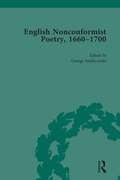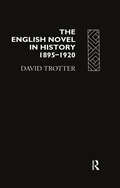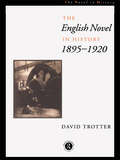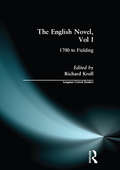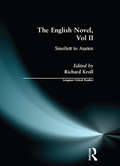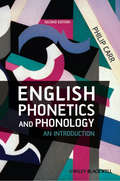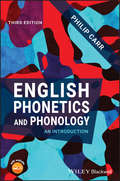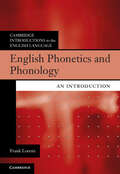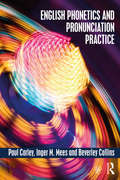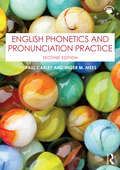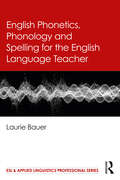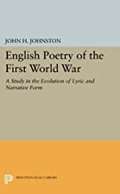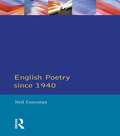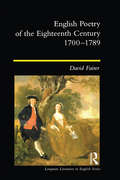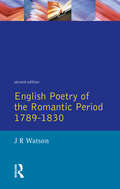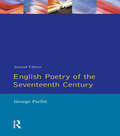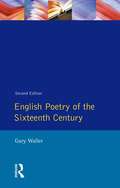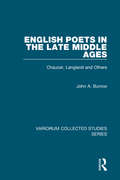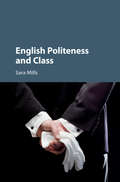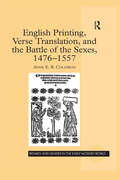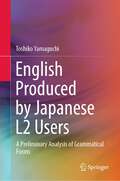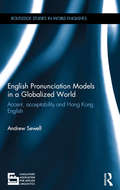- Table View
- List View
English Nonconformist Poetry, 1660-1700, vol 3
by George SouthcombeThe multi-faceted nature of dissenting verse is demonstrated, from the sonnets of the Quaker Martin Mason to the self-consciously 'witty' acrostic used to commemorate the Fifth Monarchist Vavasor Powell's death, to the Quaker schismatic John Perrot's 'A sea of the seed's sufferings'.
English Nouns
by Rochelle LieberUsing extensive data from the Corpus of Contemporary American English (Davies, 2008), this groundbreaking book shows that the syntactic patterns in which English nominalizations can be found and the range of possible readings they can express are very different from what has been claimed in past theoretical treatments, and therefore that previous treatments cannot be correct. Lieber argues that the relationship between form and meaning in the nominalization processes of English is virtually never one-to-one, but rather forms a complex web that can be likened to a derivational ecosystem. Using the Lexical Semantic Framework (LSF), she develops an analysis that captures the interrelatedness and context dependence of nominal readings, and suggests that the key to the behavior of nominalizations is that their underlying semantic representations are underspecified in specific ways and that their ultimate interpretation must be fixed in context using processes available within the LSF.
English Novel Hist 1895-1920
by David TrotterFirst Published in 1993. Written specifically for students and assuming no prior knowledge of the subject, David Trotter’s The English Novel in History 1895-1920 provides the first detailed and fully comprehensive analysis of early twentieth-century English fiction. Whereas all previous studies have been rigorously selective, Trotter looks at over 140 novelists across the whole spectrum of fiction: from the innovations of Joyce’s Ulysses through to popular mass-market genres such as detective stories and spy-thrillers. By examining the novels in both stylistic and historical terms, David Trotter looks at the ways in which writers responded to contemporary preoccupations such as the spectacle of consumption and the growth of suburbia, or to anxieties about the decline of Empire, racial ‘degeneration’ and ‘sexual anarchy’. He also challenges the view that literature of the period can be interpreted as a neat procession from realism to Modernism.
English Novel in History, 1895-1920
by David TrotterWritten especially for students and assuming no prior knowledge of the subject, David Trotter's "The English Novel in History 1895-1920" provides a comprehensive introduction to early 20th-century fiction This study embraces the whole range of early 20th-century fiction, from avant-garde innovations to popular mass-market genres. Separate sections are devoted to James, Conrad, Kipling, Bennett, Lawrence, Lewis, and Joyce. It establishes a classification of literary styles in the period. Based on this classification, it offers an account of the subject-matters which preoccupied writers of all kinds: gender, race, nationality, sexual psychology, production and consumption. "The English Novel in History" aims to redefine our understanding of literary Modernism, and should be useful reading for all students of modern English literature.
English Novel, Vol I, The: 1700 to Fielding (Longman Critical Readers)
by Richard W. KrollThe English Novel, Volume I:1700 to Fielding collects a series of previously-published essays on the early eighteenth-century novel in a single volume, reflecting the proliferation of theoretical approaches since the 1970s. The novel has been the object of some of the most exciting and important critical speculations, and the eighteenth-century novel has been at the centre of new approaches both to the novel and to the period between 1700 and 1750. Richard Kroll's introduction seeks to frame the contributions by reference to the most significant critical discussions. These include: the question of whether and how we can talk about the 'rise' of the novel; the vexed question of what might constitute a novel; the relationship between the novel and possibly competing genres such as history or the romance; the relationship between early male writers like Defoe and popular novels by women in the early eighteenth century; the general ideological role played by novels relative to eighteenth-century culture (are they means of ideological conscription or liberation?); poststructuralist analyses of identity and gender; and the emergence of sentimental and domestic codes after Richardson.Since the modern European novel is often thought to have been formed in this period, these debates have clear implications for students of the novel in general as well as for those interested in the early enlightenment. Headnotes place each essay within the map of these wider concerns, and the volume offers a useful further reading list. Taken as a whole, this collection encapsulates the state of criticism at the present moment.
English Novel, Vol II, The: Smollett to Austen (Longman Critical Readers)
by Richard. W. KrollThe English Novel, Volume II: Smollett to Austen collects a series of previously-published essays on the early eighteenth-century novel in a single volume, reflecting the proliferation of theoretical approaches since the 1970s. The novel has been the object of some of the most exciting and important critical speculations, and the eighteenth-century novel has been at the centre of new approaches both to the novel and to the period between 1750 and 1800. Richard Kroll's introduction seeks to frame the contributions by reference to the most significant critical discussions. These include: the general importance of 'sentimentalism' as a cultural movement after 1750; its relationship to the emergence of the Gothic novel as a specific genre or mode; the rapid rise in the number of women novelists in the later eighteenth century; the relationship between the novel as mediator of social relations and the idea of the 'public sphere'; the relationship between novelistic codes and the massive growth of a consumerist society; the class conflicts of writers like Smollett; the effect on the novel of the new 'British' nation; and the effects of the French Revolution and the subsequent political debates on writers like Wollstonecraft, Godwin, and Austen.This collection will be of interest to students of the later enlightenment, and also to all who are interested in late eighteenth-century radicalism, and the general relationship between literature, history, and politics.
English Part-1 class 9 - SCERT Kerala Board-24
by State Council of Educational Research and TrainingThe Class IX English Part 1 textbook by SCERT Kerala (2024 edition) is a thoughtfully curated resource designed to nurture students’ language skills and foster a deeper understanding of human experiences, values, and aspirations. The book brings together a rich blend of short stories, speeches, poems, and articles, each aligned with universal themes such as time, memory, gratitude, non-violence, dreams, and individuality. The first unit, Hours and Years, features works like Naguib Mahfouz’s “Half a Day,” Selma Lagerlof’s Nobel speech “Debts of Gratitude,” and Wislawa Szymborska’s poem “Nothing Twice,” exploring the passage of time and emotional growth. Accompanying each text are exercises that encourage critical thinking, vocabulary enhancement, grammar practice, creative expression, and collaborative learning through group projects. With an emphasis on both comprehension and expression, this textbook aims to make language learning interactive, reflective, and relevant, preparing learners to communicate effectively and empathetically in a globalised world.
English Part-2 class 9 - SCERT Kerala Board-24
by State Council of Educational Research and TrainingThe English Standard IX – Part 2 textbook, developed by SCERT Kerala, is a vibrant and inclusive reader designed for ninth-grade students. It features a diverse blend of real-life narratives, poems, and informative articles, aimed at cultivating resilience, critical thinking, and language proficiency. Unit IV, titled Strive and Thrive, includes inspiring life stories such as Bethany Hamilton’s triumphant return to surfing after a shark attack in “The Unstoppable Soul Surfer,” and Neerja Bhanot’s ultimate sacrifice during the Pan Am hijacking in “A Shield of Courage.” These narratives are complemented by Rabindranath Tagore’s powerful poem Walk Alone, which underscores inner strength and independence. Each lesson is supported by thought-provoking activities that develop communication, vocabulary, and reflective writing skills. The book also fosters media literacy and ethical digital citizenship through Unit V, Media Matters, which critically explores the influence of advertising and technology on youth. Rich in moral lessons and creative exercises, this textbook not only enhances language abilities but also encourages students to be socially aware, empathetic, and self-reliant individuals ready to face life’s challenges.
English Phonetics and Phonology: An Introduction
by Philip CarrThe second edition of the popular English Phonetics and Phonology textbook has been extensively updated and expanded to offer greater flexibility for teachers and increased support for non-native speakers studying the sound systems of English. An ideal introduction to the study of the sound systems of English, designed for those with no previous knowledge of the subject Second edition now rigorously updated and expanded to reflect feedback from existing students and to increase support for non-native speakers of English Benefits from a useful introduction to articulatory phonetics, along with coverage of the main aspects of the phonological structure of present-day English Features a completely new chapter on the relationship between English spelling and pronunciation, extended coverage of intonation, and extensive revisions to sections on rhythm, word stress, intonation and varieties of English worldwide Will include invaluable chapter-by-chapter exercises, linked to sound files available on the accompanying website at www.wiley.com/go/carrphonetics (available upon publication)
English Phonetics and Phonology: An Introduction
by Philip CarrA new edition of the popular introductory text on the phonological structure of present-day English. A clear and accessible introductory text on the phonological structure of the English language, English Phonetics and Phonology is an ideal text for those with no prior knowledge of the subject. This market-leading textbook teaches undergraduate students and non-native English speakers the fundamentals of articulatory phonetics and phonology in an engaging, easy-to-understand style. Rigorously expanded to include new materials on first and second language acquisition of English phonetics and phonology, this third edition, English Phonetics and Phonology boasts two new chapters on first-language and second-language acquisition of English phonetics and phonology. By introducing topics such as the mental lexicon and the emergence of phonological rules and representations, and graphophonemic problems in L2 acquisition, these two new chapters have been added to afford greater flexibility for teachers and increased support for non-native English speakers. Expanded website content includes exercise-linked sound files. Based on the author’s 34 years of teaching English Phonetics and Phonology in the UK and France Includes coverage of various accents in English and second-language acquisition Hugely successful textbook for the introductory Phonetics course, now in its third edition References and exercises across all chapters to guide students throughout the work Provides access to companion website for additional learning tools, sound files, and instructor resources English Phonetics and Phonology is an indispensable resource for undergraduate students in courses on Phonetics and Phonology with no prior knowledge of theoretical linguistics and non-native English speakers alike.
English Phonetics and Phonology: An Introduction (Cambridge Introductions to the English Language)
by Frank LorenzEnglish Phonetics and Phonology provides a detailed yet accessible foundational account of the science of speech sounds. Suitable for introductory courses, this textbook presents the key knowledge to comprehend the nature and function of consonant and vowel sounds as well as other characteristics of spoken language, such as stress, rhythm and intonation. With a focus on the sound system of English, examples from other languages are explored and included throughout, allowing students to better understand English sounds in contrast to these languages. Readers will discover what can be measured in speech and learn the basic functions of Praat. This hands-on-approach encourages students to make their own recordings and perform simple measurements to support their learning. While each of the fourteen chapters can be covered in one seminar, instructors can easily tailor them to fit 10–12 weeks of teaching in a phonetics or linguistics module. With no prior phonetic or linguistic knowledge needed, this textbook is suitable for first year undergraduate students, or anyone interested in developing a fundamental and sustained knowledge of the sound structure of the English language.
English Phonetics and Pronunciation Practice
by Inger M. Mees Paul Carley Beverley CollinsEnglish Phonetics and Pronunciation Practice provides a unique introduction to basic articulatory phonetics for students of English. Built around an extensive collection of practice materials, this book teaches the pronunciation of modern standard non-regional British English to intermediate and advanced learners worldwide. This book: provides an up-to-date description of the pronunciation of modern British English; demonstrates the use of each English phoneme with a selection of high-frequency words, both alone and in context in sentences, idiomatic phrases and dialogues; provides examples and practice material on commonly confused sounds, including illustrative pronunciation diagrams; is supported by a companion website featuring phonetic transcriptions and over 30 hours of practice audio material to check your pronunciation against; can be used not only for studying pronunciation in the classroom but also for independent student practice. English Phonetics and Pronunciation Practice is essential reading for any student studying this topic.
English Phonetics and Pronunciation Practice
by Inger M. Mees Paul CarleyEnglish Phonetics and Pronunciation Practice provides a unique introduction to basic articulatory phonetics for students of English. Taking a practical approach, this book teaches the pronunciation of modern standard non-regional British English to intermediate and advanced learners worldwide.Now fully updated and restructured, the more concise new edition:• provides an up-to-date description of the pronunciation of modern British English;• demonstrates the use of English consonants and vowels in a variety of contexts and in contrast with other sounds with which they may be confused;• includes expanded theory sections for an improved balance of theory and practice;• is supported by extensive online audio material.Ideal for studying pronunciation in the classroom or for independent student practice, English Phonetics and Pronunciation Practice is essential reading for any student of pronunciation and phonetics.
English Phonetics, Phonology and Spelling for the English Language Teacher (ESL & Applied Linguistics Professional Series)
by Laurie BauerThis resource supports TESOL preservice and in-service teachers and curriculum designers in teaching pronunciation more effectively. Laurie Bauer examines the patterns of pronunciation found in English, comments on common errors made by learners, provides advice on what must be taught and what can be allowed to pass, and offers commentary on which parts of the curriculum are necessary for beginners and which are of value only to advanced students. Part I introduces the phonetic background; Part II covers phonetics in more detail (consonants, vowels, prosody, phonotactics and syllables); Part III covers phonology (sound changes influenced by adjacent sounds, morphophonemics, stress rules and free variation); and Part IV covers spelling (English spelling, spelling consonants and vowels, and spelling particularly difficult words). The helpful content can be tailored to one’s teaching needs and will support an educator’s efforts to teach pronunciation seriously, whether it is a matter of pronouncing particular vowels accurately or knowing how to interpret the spelling system to get at the appropriate pronunciation.
English Poetry Of The First World War
by John H. JohnstonThe author deals with the shock of World War I as it was registered in the work of Rupert Brooke, Siegfried Sassoon, Edmund Blunden, Wilfred Owen, Isaac Rosenberg, Herbert Read, and David Jones. He finds in Read and Jones the culmination of a tendency away from personal lyric response toward formal control and a positive vision.
English Poetry Since 1940 (Longman Literature In English Series)
by Neil CorcoranNeil Corcoran's book is a major survey and interpretation of modern British poetry since 1940, offering a wealth of insights into poets and their work and placing them in a broader context of poetic dialogue and cultural exchange. The book is organised into five main parts, beginning with a consideration of the late Modernism of T. S. Eliot and W. H. Auden and ranging, decade by decade, from the poetry of the Second World War and the `New Romanticism' of Dylan Thomas to the Movement, the poetry of Northern Ireland, the variety of contemporary women's poetry and the diversity of the contemporary scene. The book will be especially useful for students as it includes detailed and lively readings of works by such poets as Ted Hughes, Seamus Heaney and Philip Larkin.
English Poetry of the Eighteenth Century, 1700-1789 (Longman Literature In English Series)
by David FairerIn recent years the canon of eighteenth-century poetry has greatly expanded to include women poets, labouring-class and provincial poets, and many previously unheard voices. Fairer’s book takes up the challenge this ought to pose to our traditional understanding of the subject. This book seeks to question some of the structures, categories, and labels that have given the age its reassuring shape in literary history. In doing so Fairer offers a fresh and detailed look at a wide range of material.
English Poetry of the Romantic Period 1789-1830 (Longman Literature In English Series)
by J. R. WatsonOn its first appearance English Poetry of the Romantic Period was widely praised as on of the best introductions to the subject. This edition includes updated material in the light of recent work in Romanticism and Romantic poetry. The book discusses the concerns that linked the Romantic poets, from their responses to the political and social upheavals around them to their interest in the poet's visionary and prophetic role. It includes helpful and authoritative discussions of figures such as Blake, Clare, Coleridge, Crabbe, Keats, Scott, Shelley and Wordsworth.
English Poetry of the Seventeenth Century (Longman Literature In English Series)
by George ParfittProvides a comprehensive and entertaining account of the vitality and variety of achievement in seventeenth-century English poetry. Revised and up-dated throughout, Dr Parfitt has added new material on poets as varied as Marvell and Traherne. There is also a completely new chapter on women poets of the seventeenth century which considers the significant contributions of writers such as Katherine Philips and Margaret Cavendish. The proven quality and success of Dr Parfitt's survey makes this the essential companion for the teacher and student of seventeenth-century verse.
English Poetry of the Sixteenth Century (Longman Literature In English Series)
by Gary F. WallerExplores the poetry of the Renaissance, from Dunbar in the late 15th century to the Songs and Sonnets of John Donne in the early 17th. The book offers more than the wealth of literature discussed: it is a pioneering work in its own right, bringing the insights of contemporary literary and cultural theory to an overview of the period.
English Poets in the Late Middle Ages: Chaucer, Langland and Others (Variorum Collected Studies #1002)
by John A. BurrowThis volume brings together a selection of lectures and essays in which J.A. Burrow discusses the work of English poets of the late fourteenth and early fifteenth centuries: Chaucer, Gower, Langland, and Hoccleve, as well as the anonymous authors of Pearl, Saint Erkenwald, and a pair of metrical romances. Six of the pieces address general issues, with some reference to French and Italian writings ('Autobiographical Poetry in the Middle Ages', for example, or 'The Poet and the Book'); but most of them concentrate on particular English poems, such as Chaucer's Envoy to Scogan, Gower's Confessio Amantis, Langland's Piers Plowman, and Hoccleve's Series. Although some of the essays take account of the poet's life and times ('Chaucer as Petitioner', 'Hoccleve and the 'Court''), most are mainly concerned with the meaning and structure of the poems. What, for example, does the hero of Ipomadon hope to achieve by fighting, as he always does, incognito? Why do the stories in Piers Plowman all peter out so inconclusively? And how can it be that the narrator in Chaucer's Book of the Duchess so persistently fails to understand what he is told?
English Politeness and Class
by Sara MillsPoliteness plays a vital role in maintaining class differences. In this highly original account, Sara Mills analyses the interrelationship between class and linguistic interaction, uncovering the linguistic ideologies behind politeness in British English. She sheds light on the way politeness and rudeness interrelate with the marking of class boundaries, and reveals how middle-class positions in society are marked by people's use of self-deprecation, indirectness and reserve. Systematically challenging received wisdom about cross-cultural and inter-cultural differences, she goes beyond the mere context of the interaction to investigate the social dimension of politeness. This approach enables readers to analyse other languages in the same way, and a range of case studies illustrate how ideologies of politeness are employed and judged.
English Printing, Verse Translation, and the Battle of the Sexes, 1476-1557 (Women and Gender in the Early Modern World)
by Anne E.B. ColdironBringing to light new material about early print, early modern gender discourses, and cultural contact between France and England in the revolutionary first phase of English print culture, this book focuses on a dozen or so of the many early Renaissance verse translations about women, marriage, sex, and gender relations. Anne Coldiron here analyzes such works as the Interlocucyon; the Beaute of Women; the Fyftene Joyes of Maryage; and the Complaintes of the Too Soone and Too Late Maryed as well as the printed translations of writings of Christine de Pizan. Her selections identify an insufficiently discussed strand of English poetry, in that they are non-elite, non-courtly, and non-romance writings on women's issues. She investigates the specific effects of translation on this alternative strand of poetry, showing how some French poems remain stable in the conversion, others subtly change emphasis in their new context, but some are completely transformed. Coldiron also emphasizes the formal and presentational dimensions of the early modern poetic book, assessing the striking differences the printers' paratexts and visual presentation strategies make to the meaning and value of the poems. A series of appendices presents the author's transcriptions of the texts that are otherwise inaccessible, never having been edited in modern times.
English Produced by Japanese L2 Users: A Preliminary Analysis of Grammatical Forms
by Toshiko YamaguchiThis book discusses eight grammatical items, with main focus on prepositions and plural nouns, to illustrate the structure of Japanese English or the English spoken by 32 Japanese nationals who are the L2 users of English. Adopting an inductive, theory-neutral, analysis of empirical data collected from recordings of presentational talks, the author demonstrates how standard and nonstandard grammatical forms are distributed, and categorizes these based largely on functional factors. The book describes grammatical forms as a fundamental aspect of linguistic study and adopts a corpus-driven approach to qualify structural features characterizing usage data. This formalization of language usage patterns also facilitates the development of ‘locally’ relevant norms and thus presents alternatives to the normative varieties traditionally adopted. It examines the effects of multicompetence and unpacks the grammar of Japanese English. The book is of interest to researchers, educators, and students concerned with issues related to World Englishes, English as a lingua franca, English language teaching, and multilingualism, this text is vital to studies in global English language use.
English Pronunciation Models in a Globalized World: Accent, Acceptability and Hong Kong English (Routledge Studies in World Englishes)
by Andrew SewellThis book explores the topics of English accents and pronunciation. It highlights their connections with several important issues in the study of English in the world, including intelligibility, identity, and globalization. The unifying strand is provided by English pronunciation models: what do these models consist of, and why? The focus on pronunciation teaching is combined with sociolinguistic perspectives on global English, and the wider question asked by the book is: what does it mean to teach English pronunciation in a globalized world? The book takes Hong Kong – ‘Asia’s World City’ – as a case study of how global and local influences interact, and of how decisions about teaching need to reflect this interaction. It critically examines existing approaches to global English, such as World Englishes and English as a Lingua Franca, and considers their contributions as well as their limitations in the Hong Kong context. A data-based approach with quantitative and qualitative data anchors the discussion and assists in the development of criteria for the contents of pronunciation models. English Pronunciation Models in a Globalized World: Accent, Acceptability and Hong Kong English discusses, among other issues: Global English: A socio-linguistic toolkit Accents and Communication: Intelligibility in global English Teaching English Pronunciation: The models debate Somewhere Between: Accent and pronunciation in Hong Kong Researchers and practitioners of English studies and applied linguistics will find this book an insightful resource.
